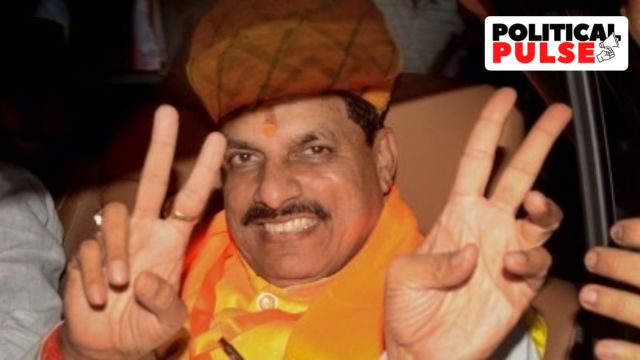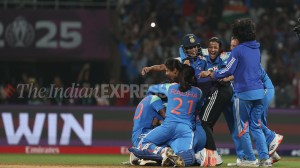New MP govt muscles in now, but politics over meat recent for Sangh
“Sangh keeps its dietary preferences in tune with the region. We never say one food superior. Within Sangh, there is never a debate on diet,” says an old-timer.
 Madhya Pradesh Chief Minister Mohan Yadav issued an order banning loudspeakers and DJs at religious gatherings and public places. (Express file photo)
Madhya Pradesh Chief Minister Mohan Yadav issued an order banning loudspeakers and DJs at religious gatherings and public places. (Express file photo)Hours after taking oath as Madhya Pradesh Chief Minister, Mohan Yadav on Wednesday issued an order banning loudspeakers and DJs at religious gatherings and public places, and said shops selling meat would now be subjected to “enforcement of guidelines”. On Thursday, several shops in Ujjain saw action by authorities.
Earlier this month, hours after the BJP won the Rajasthan Assembly elections, videos of first-time MLA Balmukundachary railing against the sale of meat in his Hawa Mahal constituency in Jaipur went viral on social media.
These two developments are a continuation of a series of decisions and articulations made in the past few years in BJP-ruled states where the sale of meat has been exclusively picked out for regulation. Often these articulations have bordered on picking vegetarianism as a purer form of diet and singling out a particular community engaged in the meat trade. The decisions have varied from a ban on the sale of meat during Hindu religious festivals such as Navratri and around religious sites to removing eggs from midday meals of government schools.
Neither the BJP nor its ideological fountainhead RSS have historically had a problem with non-vegetarianism. In the past, the two organisations largely restricted their dietary abhorrence to beef. “Sangh has never promoted vegetarianism. You may see Sangh functions being served with totally vegetarian food but it has more to do with economics. Historically, Sangh was never flush with funds so relied on cheap vegetarian food for its functions. It slowly became a culture. But, a large number of Sangh leaders are non-vegetarian. Sangh believes the Hindu dharma includes the orders of both sattvic and tamasic,” said Ratan Sharda, a lifelong RSS member who has written several books on the organisation.
According to Sharda, in general, the Sangh’s stand on cow meat is clear: it should not be eaten. “But even there Sangh has made adjustments in the Northeast and certain other places. Sangh pracharaks who work in the Northeast, eat what the local people eat. In 1969, there was an RSS adhiveshan (session) in Assam and many local leaders who joined were beef eaters. There were murmurs within the organisation that these people could not be called Hindus. Guru Golwalkar, however, said they were all Hindus and might have resorted to eating beef because of economic reasons. He said they would come around with time. Sangh has had no argument with society over dietary habits,” he said.
A senior RSS leader explained that barring beef, creating a nationwide cultural narrative over diet had been considered counterproductive for the organisation’s expansion and the larger project of Hindu unity. “People of all hues come to the Sangh. In the coastal belt and states such as Kerala, everyone is non-vegetarian. Sangh keeps its dietary preferences in tune with the region it operates in. We never say one food is superior to the other. Within the Sangh there is never a debate on diet,” he said.
Former RSS leader K N Govindacharya, however, said Sangh historically had had a problem with meat being sold in pilgrimage towns and around religious sites. “That is how Haridwar became vegetarian. There have been similar arguments for Mathura and Vrindavan. It was the responsibility of the government to ensure this, but there were lapses. But there is no blanket ban on meat-eating for Sangh,” he said.
A senior BJP leader said the push towards vegetarianism in the large political narrative of the party was a recent phenomenon. The leader narrated an anecdote from a meeting of the Bharatiya Jana Sangh, the precursor to the party, held in Kolkata in 1954 following the death of its founder Syama Prasad Mookerjee the year before. Some 25-odd leaders were hosted by a local Jana Sangh functionary who wanted to serve non-vegetarian food for dinner in accordance with Bengali traditions. But, he was unsure of their dietary preferences. Since it was found impolite to ask this question publicly in a meeting, chits were passed around for people to tick mark their dietary preferences. “Only two turned out to be vegetarians,” said the BJP leader.
Photos



- 01
- 02
- 03
- 04
- 05




























